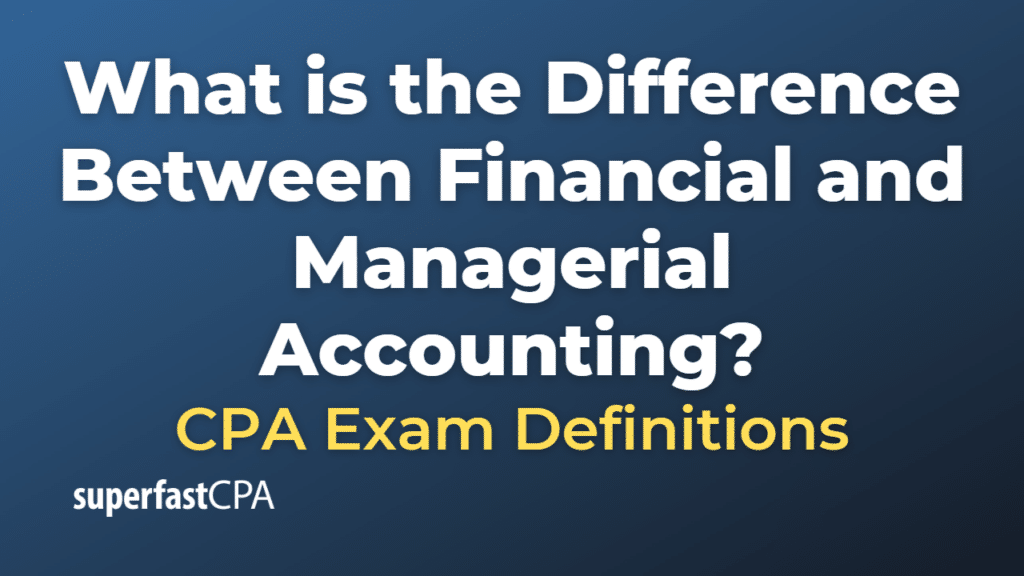Difference Between Financial and Managerial Accounting
Financial accounting and managerial accounting are two different functions of accounting that serve different purposes and different audiences.
Financial Accounting
Financial accounting is primarily concerned with recording transactions, preparing financial statements, and communicating financial information to external users such as shareholders, creditors, and regulatory bodies. The goal is to provide an accurate and complete picture of the company’s financial performance and position. This information is presented in the form of financial statements, including the income statement, balance sheet, and cash flow statement.
Financial accounting must follow specific accounting principles and standards such as the Generally Accepted Accounting Principles (GAAP) in the United States or International Financial Reporting Standards (IFRS) elsewhere. These rules aim to ensure consistency and comparability across different companies.
Managerial Accounting
Managerial accounting, on the other hand, is focused on providing information to internal users — mainly the company’s management. This information is used for planning, decision-making, and control within the company. Unlike financial accounting, managerial accounting is not bound by formal standards, which allows for more flexibility in the type and format of information presented.
Managerial accounting includes things like budgeting, forecasting, cost analysis, profitability analysis, variance analysis, and other types of decision-support information. The aim is to provide the information that managers need to make strategic and operational decisions, improve efficiency, and achieve the company’s objectives.
Key Differences
- Users of Information: Financial accounting serves external users, while managerial accounting serves internal users.
- Regulatory Framework : Financial accounting must adhere to specific standards such as GAAP or IFRS. In contrast, managerial accounting is not regulated by these standards.
- Purpose of Information: Financial accounting aims to provide a historical record of the company’s financial performance and position, while managerial accounting focuses on providing forward-looking information for decision-making and planning.
- Frequency and Timeliness: Financial accounting reports are generally prepared for set periods (quarterly, annually). Managerial accounting reports can be prepared as often as needed and may provide real-time information.
- Detail of Information: Financial accounting reports provide a broad overview of the company’s financial status. Managerial accounting reports can be very detailed, breaking down costs, revenues, and profitability by product, location, customer, or other relevant segment.
- Focus: Financial accounting is more monetary-focused, while managerial accounting also considers non-monetary information like quantities, efficiency, quality, and more.
In essence, financial and managerial accounting are two sides of the same coin — both essential for the effective management and oversight of a business, but serving different purposes and audiences.
Example of the Difference Between Financial and Managerial Accounting
Let’s use the example of a clothing manufacturing business:
Financial Accounting Example
The clothing manufacturing business has external stakeholders such as investors, creditors, and regulatory authorities that need to understand the company’s financial performance and condition. Thus, the company’s financial accountants prepare an income statement, balance sheet, and cash flow statement each quarter and year-end.
The income statement might show revenues of $5 million, cost of goods sold of $3 million, and operating expenses of $1 million, resulting in a net income of $1 million. This kind of high-level financial information is useful to external stakeholders to understand the company’s profitability, financial stability, and growth potential.
Managerial Accounting Example
Inside the same company, the management team needs detailed, forward-looking information to make strategic decisions. They want to know the cost of producing each type of clothing item they manufacture, which items are most profitable, how much they should budget for marketing next quarter, or whether they should invest in new manufacturing equipment.
To help answer these questions, managerial accountants provide detailed reports and analyses. For instance, they might perform a product profitability analysis that breaks down the direct materials, direct labor, and overhead costs for each clothing item. This analysis reveals that one particular item has a much higher profit margin than others, leading the management team to decide to focus more resources on that item.
Managerial accountants might also prepare a budget for the next quarter, including expected revenues, production costs, marketing expenses, etc. They could also do a cost-benefit analysis of the proposed investment in new manufacturing equipment, factoring in the expected increase in efficiency and reduction in labor costs.
In summary, while financial accounting helps external stakeholders understand the company’s overall financial health, managerial accounting provides the detailed, forward-looking information that managers need to run the company day-to-day and make strategic decisions.













